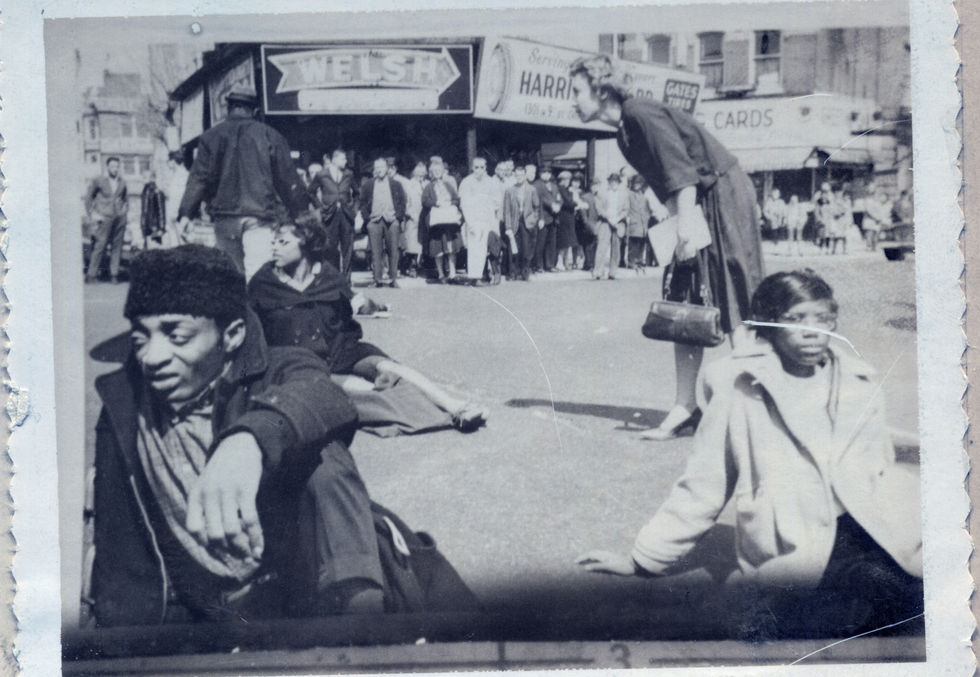

9 W. Front Street Media, PA 19063
Hours:
Tuesday, Wednesday, and Thursday- 10 AM to 3 PM (please knock or ring doorbell for entrance)
Research Appointment by request only, please click on the research tab to put in a request.
Founded 1895

Phone: 610-750-0622

CIVIL RIGHTS & SEGREGATION
1960's Protests in Chester, PA
HISTORICAL BACKGROUND
In the early part of the 1900’s, Chester was a city on the rise with a burgeoning population and booming waterfront industry. An influx of immigrants and Black families arrived in the city attracted by the job opportunities available. Industry giants like Sun Oil, Sun Shipbuilding, Sunoco, Ford Motors and others built to support WWI experienced another resurgence with the onset of WWII. After the end of the war, industry operations slowed, and the city was in a state of post-industrial decline.
Schools, businesses and housing in Chester remained segregated and integration was at a standstill. The disenfranchisement of the city’s Black population due to discriminatory practices and political corruption left the community feeling powerless and without a voice in the government.
Even though the U.S. Supreme Court had ruled on Brown v. the Board of Education of Topeka 10 years earlier, schools in Chester with a majority of Black students were poorly funded and had inadequate resources. One example was Franklin School that had a 95 percent Black student body. Classes were taught in the basement coal bin as there was not enough space for the 1,000 students there in 1963. The school had been built in 1910 to hold 500 students.
Parents of students appealed to the Chester City School Board for better conditions and integrated school facilities. With no action taken by the school board, parents and local organizers staged a picket line outside of Franklin Elementary School on November 3, 1963, thus, launching the beginning of a series of protests calling for the end of de-facto segregation practices that continued well into 1964.
In 1964, demonstrations continued with school boycotts, marches and sit-ins. The events caught national attention and put Chester on the front stage of the national civil rights movement, attracting leaders like Malcolm X, Dick Gregory and others to speak out against racial discrimination in the city.
Police brutality was evident as officers swung clubs at protesters, who threw rocks and bricks in retaliation. State police were called into the city and more than 600 were arrested. Civil rights activist James Farmer called Chester “The Birmingham of the North.” At the time, Delaware County Court of Common Pleas Judge William Toal said the city was close to administering martial law.
The demonstrations ended after then-Gov. William Scranton established the Pennsylvania Human Relations Committee, which investigated the Chester School Board and held hearings. Their findings eventually led to the order that mandated the district desegregate its schools.
The role of Delaware County Historical Society is to collect, protect and preserve the diverse history and culture of Delaware County. It is important to highlight and educate others on this significant period of Delaware County and Chester City’s history. Knowing the history of racial segregation and discrimination in Chester is key towards understanding and embracing the challenges of today.
Watch the Feb. 23 Online Event
"Civil Rights & School Segregation - 1960's Chester"
RESOURCES & LINKS
NEWSPAPERS:
-
Delco Times/Daily Times historic digital archive available on Delaware County Library website
-
The Militant: Interview with Stanley Branche (April 6, 1964)
-
George Raymond papers & scrapbook- available at Widener University archives
JOURNALS/ARTICLES:
-
"1917 Race Riot In Chester, Pennsylvania" by Eric Ledell Smith, The State Museum of Pennsylvania.
-
Learn about Sun Shipbuilding's segregated shipyard: "Pie in the Sky vs. Meat and Potatoes: The Case of Sun Ship's Yard #4)" by John M. McLarnon
OTHER DIGITAL ARCHIVES:
-
"Report of the Commission Appointed by the Governor to investigate charges of excessive use of force by police in Chester, PA." Pennsylvania Human Relations Commission. 1964
-
Black History lecture by Mathew Jenkins (DCHS cassette tape archives, below)
-
"The Community and Racial Crisis" Practising Law Institute, 1964.
BOOKS (available at DCHS):
-
Harris, Richard E. Politics and Prejudice: Small-town Blacks Battle a Corrupt System. Original publication 1991.
-
Mele, Chris. Race and the Politics of Deception: the Making of an American City. NYU Press, 2017.
-
McLarnon, John J. Ruling Suburbia: John J. McClure and the Republican Machine in Delaware County, Pennsylvania.
Produced and created by Erica Burman, DCHS Board Member, 2021
These resources and more can be found at DCHS Research and Library, 9 W. Front Street Media, PA
To schedule your appointment, please contact Zac at
research@padelcohistory.org or 610-750-0622.
"Black History of Chester" audio recording
Presentation by Matthew Jenkins to 1984 Chester High School students
MAPS
























